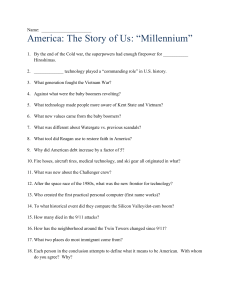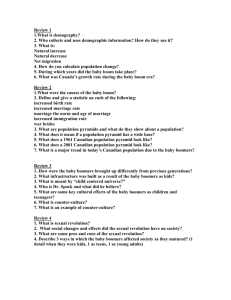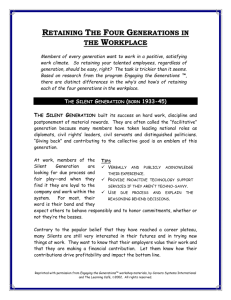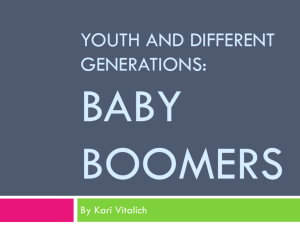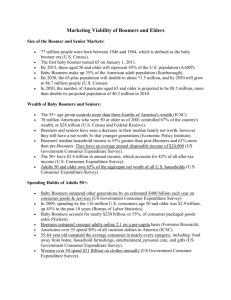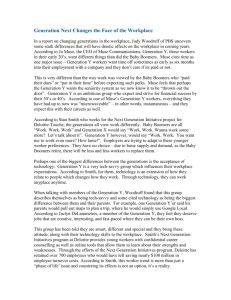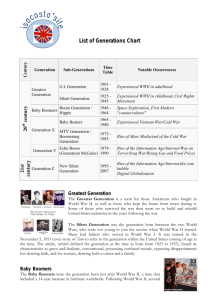Generation (from the Latin generāre, meaning "to
advertisement
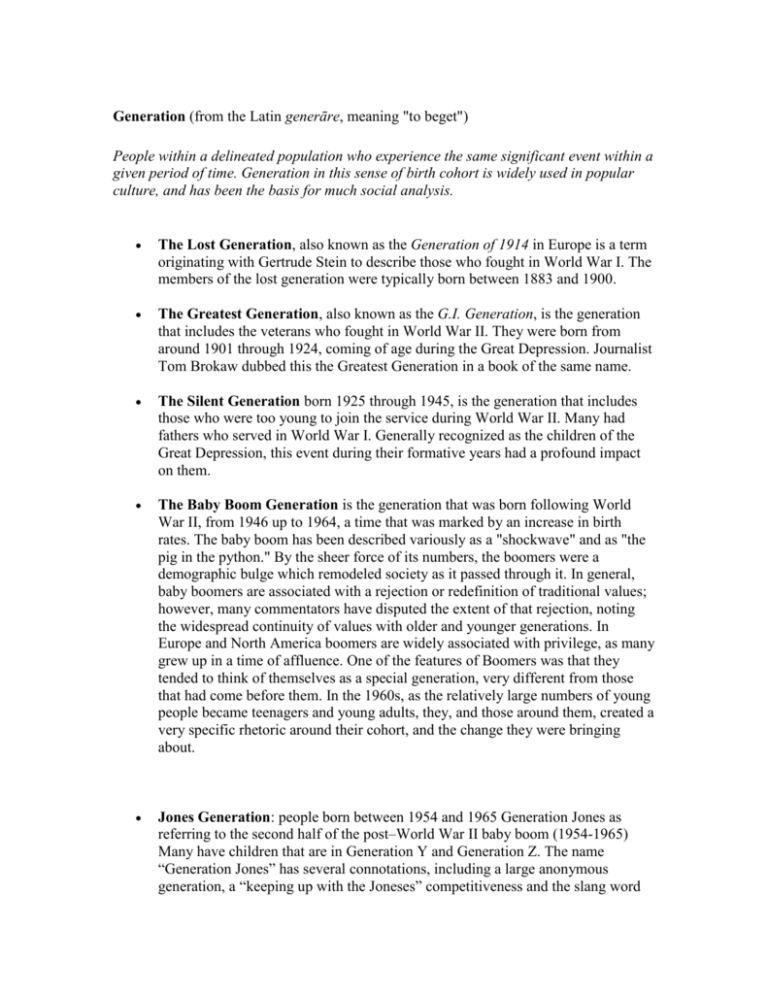
Generation (from the Latin generāre, meaning "to beget") People within a delineated population who experience the same significant event within a given period of time. Generation in this sense of birth cohort is widely used in popular culture, and has been the basis for much social analysis. The Lost Generation, also known as the Generation of 1914 in Europe is a term originating with Gertrude Stein to describe those who fought in World War I. The members of the lost generation were typically born between 1883 and 1900. The Greatest Generation, also known as the G.I. Generation, is the generation that includes the veterans who fought in World War II. They were born from around 1901 through 1924, coming of age during the Great Depression. Journalist Tom Brokaw dubbed this the Greatest Generation in a book of the same name. The Silent Generation born 1925 through 1945, is the generation that includes those who were too young to join the service during World War II. Many had fathers who served in World War I. Generally recognized as the children of the Great Depression, this event during their formative years had a profound impact on them. The Baby Boom Generation is the generation that was born following World War II, from 1946 up to 1964, a time that was marked by an increase in birth rates. The baby boom has been described variously as a "shockwave" and as "the pig in the python." By the sheer force of its numbers, the boomers were a demographic bulge which remodeled society as it passed through it. In general, baby boomers are associated with a rejection or redefinition of traditional values; however, many commentators have disputed the extent of that rejection, noting the widespread continuity of values with older and younger generations. In Europe and North America boomers are widely associated with privilege, as many grew up in a time of affluence. One of the features of Boomers was that they tended to think of themselves as a special generation, very different from those that had come before them. In the 1960s, as the relatively large numbers of young people became teenagers and young adults, they, and those around them, created a very specific rhetoric around their cohort, and the change they were bringing about. Jones Generation: people born between 1954 and 1965 Generation Jones as referring to the second half of the post–World War II baby boom (1954-1965) Many have children that are in Generation Y and Generation Z. The name “Generation Jones” has several connotations, including a large anonymous generation, a “keeping up with the Joneses” competitiveness and the slang word "jones" or “jonesing”, meaning a yearning or craving. It is said that Jonesers were given huge expectations as children in the 1960s, and then confronted with a different reality as they came of age in the 1970s and 1980s, leaving them with a certain unrequited, jonesing quality. Generation X (also known as the 13th Generation and the Baby Busters) is the generation generally defined as those born after the baby boom ended, from 1965 to 1981. The term generally includes people born during all or part of the 1960s: According to Strauss-Howe generational theory, 1961 is the starting point, though other sources, including the U.S. Census Bureau, consider it to have started in the mid-1960s. It ends in late 1970s to early 1980s, usually not later than 1981 or 1982. The term has also been used in different times and places for a number of different subcultures or countercultures since the 1950s. Millennials, also known as Generation Y, Generation Next, Net Generation, Echo Boomers, describes the generation following Generation X from probably 1981 to 1999. As there are no precise dates for when the Millennial generation starts and ends, commentators have used birth dates ranging somewhere from the mid-1970s to the early 2000s (decade). Experts differ on the start date of Generation Y. William Strauss and Neil Howe use the start year as 1982, and end years around the turn of the millennium, while others use start years that are earlier or later than 1982, and end years in the mid-1990s. One segment of this age-group has often been called the “eighties babies” generation, in reference to the fact that they were born between January 1, 1980 and December 31, 1989. Generation Z, also known as Generation I, or Internet Generation, the Pluralist Generation, DREAMER Generation, AO (always on), Generation Text, and the "Digital Natives" by Marc Prensky and is the following generation. The earliest birth is generally dated in the early 1990s. ALPHA generation Eastern world In China, the Post-80s (Chinese: 八零后世代 or 八零后) (born-after-1980 generation) (also sometimes called China's Generation Y) are those who were born between the year 1980 to 1989 in urban areas of Mainland China. These people are also called "Little Emperors" (or at least the first to be called so) because of the People's Republic of China's one-child policy. Growing up in modern China, China’s Gen Y has been characterized by its optimism for the future, newfound excitement for consumerism and entrepreneurship and acceptance of its historic role in transforming modern China into an economic superpower. Other Chinese generations are also named in a similar fashion, with Post-90s (Chinese: 九零后) referring to modern teenagers and college students. (Quoted From "Post-80's in Hong Kong" section in Post-80s) Post-80s in Hong Kong and the after-eighty generation in mainland China are for the most part different. The term Post-80s (八十後) came into use in Hong Kong between 2009 and 2010, particularly during the course of the opposition to the Guangzhou-Hong Kong Express Rail Link, during which a group of young activists came to the forefront of the Hong Kong political scene. They are said to be "post-materialist" in outlook, and they are particularly vocal in issues such as urban development, culture and heritage, and political reform. Their campaigns include the fight for the preservation of Lee Tung Street, the Star Ferry Pier and the Queen's Pier, Choi Yuen Tsuen Village, real political reform (on June 23), and a citizen-oriented Kowloon West Art district. Their discourse mainly develops around themes such as anti-colonialism, sustainable development, and democracy. In South Korea, generational cohorts are often defined around the democratization of the country, with various schemes suggested including names such as the "democratization generation", 386 generation (also called the "June 3, 1987 generation"), that witnessed the June uprising, the "April 19 generation" (that struggled against the Syngman Rhee regime in 1960), the "June 3 generation" (that struggled against the normalization treaty with Japan in 1964), the "1969 generation" (that struggled against the constitutional revision allowing three presidential terms), and the shinsedae ("new") generation. In India, generations tend to follow a pattern similar to the broad western model, although there are still major differences, especially in the older generations.[74] According to one interpretation, Indian independence in 1947 marked a generational shift in India. People born in the 1930s and 1940s tended to be loyal to the new state and tended to adhere to "traditional" divisions of society. Indian "boomers", those born after independence and into the early 1960s, tended to link success to leaving India and were more suspicious of traditional societal institutions. Events such as the Indian Emergency made them more sceptical of government. Generation X saw an improvement in India's economy and they are more comfortable with diverse perspectives. Generation Y continues this pattern. Other generations The term generation is sometimes applied to a cultural movement, or more narrowly defined group than an entire demographic. Some examples include: The Beat Generation, a popular American cultural movement that most social scholars say laid the foundation of the pro-active American counterculture of the 1960s. It consisted of Americans born between the two world wars who came of age in the rise of the automobile era, and the surrounding accessibility they brought to the culturally diverse, yet geographically broad and separated nation. The Beat Generation is between the Silent Generation and the Baby Boomers. Younger Baby Boomers are sometimes designated Generation Jones. Jones Generation: people born between 1954 and 1965 The Hip Hop Generation, another popular American cultural movement describing a musical and cultural phenomenon that from humble beginnings had an international impact. Coined by author Bakari Kitwana, it describes a generation of people, regardless of race, who came of age in post-segregation America. Kitwana establishes the years 1965-1984, which includes Generation X and Generation Y. The Stolen Generation, children of Australian Aboriginal and Torres Strait Islander descent who were removed from their families by the Australian Federal and State government agencies and church missions, under acts of their respective parliaments between approximately 1869 and 1969. The Generation of €700 is a term popularized by the Greek mass media and refers to educated Greek twixters of urban centers who generally fail to establish a career. Young adults are usually forced into underemployment in temporary and occasional jobs, unrelated to their educational background, and receive the minimum allowable base salary of €700. This generation evolved in circumstances leading to the Greek debt crisis and participated in the 2010–2011 Greek protests. MTV Generation, youth of the late 20th and early 21st centuries who are heavily influenced by popular culture and mass media.

